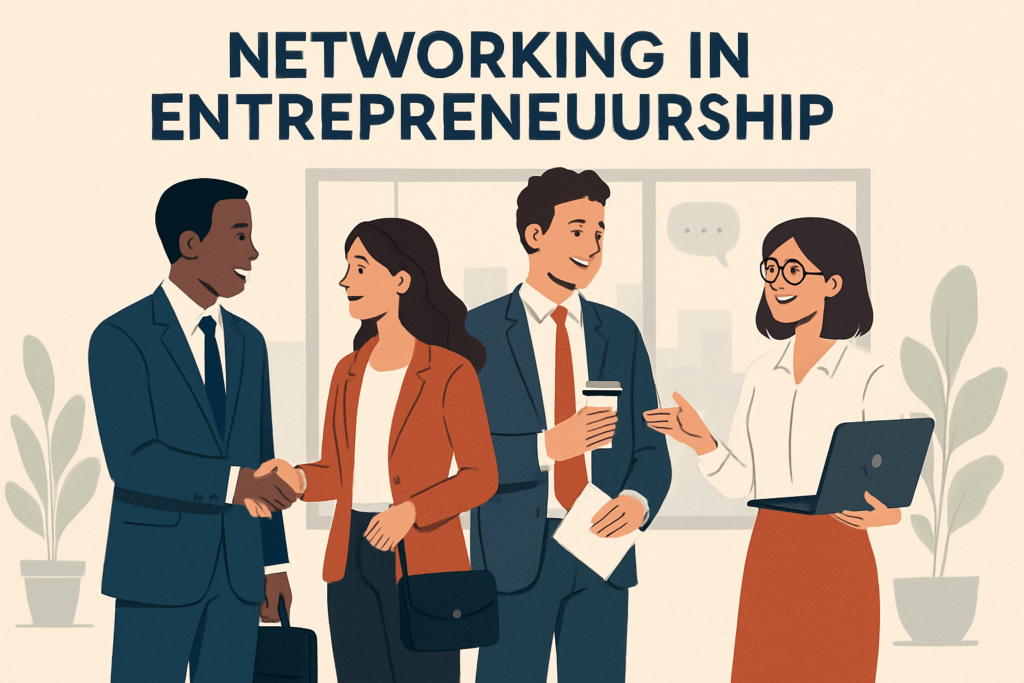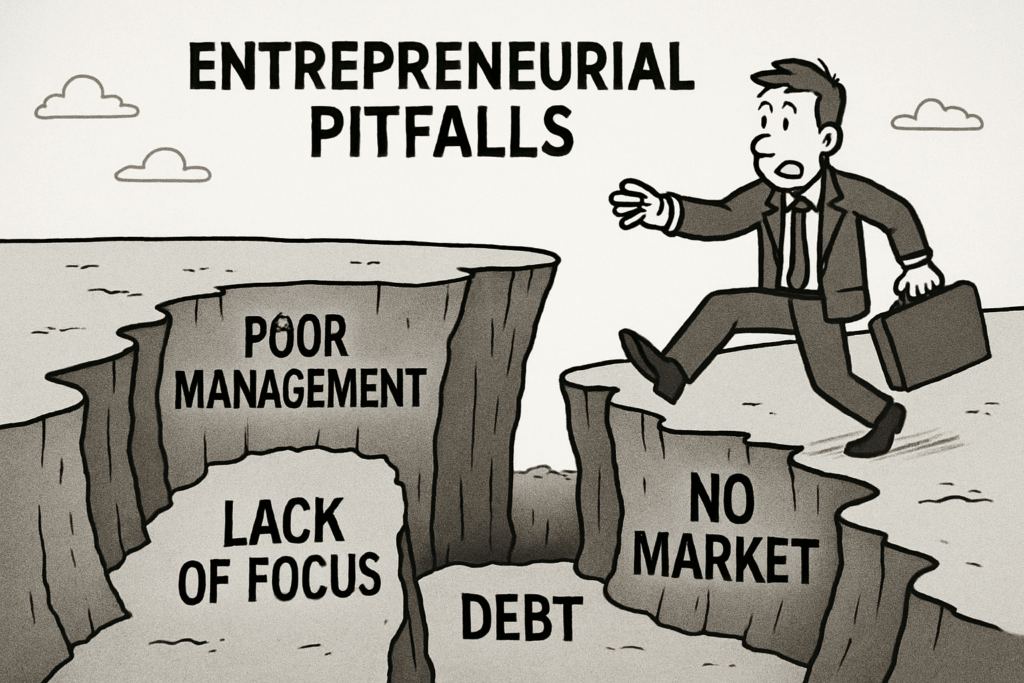Networking in Entrepreneurship: Why Connections Build Success
- Open with a short story or scenario about a founder landing a key meeting or insight thanks to the right introduction.
- Introduce networking in entrepreneurship as a foundational skill, not a luxury.
- Set the stage: networking isn’t awkward schmoozing—it’s powerful, daily relationship building.
Networking in Entrepreneurship: Why Connections Build Success
Picture this: It’s 8:12 p.m., you’re staring at an inbox with more rejection emails than actual opportunities, and then—ping—a message from a fellow founder lands in your DMs. They heard you’re building a B2B SaaS tool and just introduced you to their ex-investor. Three emails later, you’re sitting in front of someone who not only funds your startup, but who also shares a simple product tweak that saves you three months of stumbling in the dark. That’s not luck. That’s networking at work.
Here’s the thing: networking in entrepreneurship isn’t something you do after you build a product or once you “have time.” It’s foundational—like product-market fit or knowing your numbers. For founders and builders, connections aren’t a luxury; they are a lever. Most of us picture networking as stiff handshakes at overcrowded events, trading business cards and forced small talk. But that’s missing the real point. Every intro, every genuine follow-up, and every conversation where you ask about someone else’s journey plants a seed for tomorrow’s breakthroughs.
Networking isn’t about “schmoozing” or pretending to like canapés. It’s showing up—daily, sometimes in small ways—for people in your ecosystem. Thoughtful comments in group chats. Coffee with a new hire’s friend. A DM to congratulate someone on their launch. This ongoing, unglamorous work is how relationships are built, and in entrepreneurship, relationships move the needle more than perfect code or clever slogans ever will.
The Case for Networking: More Than Just Luck
Think about networking in entrepreneurship as engineering “luck.” Every time you reach out, connect, or follow up, you increase the surface area for opportunity. Serendipity doesn’t happen to people in a vacuum; it finds its way through people. A founder who’s plugged in—grabbing coffee, sending a DM, replying to a friend of a friend—finds doors opening almost by accident. But it’s not really accidental. The more connections you build, the more likely you are to be in the right place at the right time.
There’s real science behind this. Sociologist Mark Granovetter coined the concept of “the strength of weak ties.” Basically, your loose connections—past coworkers, someone you met once at a meetup—are just as likely, or more so, to spark a game-changing intro than your closest colleagues. That’s network power. Someone has an investor friend. Someone else knows a great developer looking for a side gig. Or a casual acquaintance happens to have survived the exact startup crisis you’re now facing—and can offer blunt advice.
Networking in entrepreneurship isn’t a lottery. It’s about quietly, consistently wiring yourself into the flow of information, insight, and introductions. The cliché “it’s not what you know, it’s who you know” falls short. In startup land, it’s both—and your network is the multiplier.
What Real Networking Looks Like
Forget tuxedos and name tags. Real networking in entrepreneurship happens in the trenches: a quick DM to someone you admire on LinkedIn; a Zoom coffee with a founder facing the same struggles; jumping into a local industry meet-up after work, even if you’re tired. It means sharing a helpful resource in a Slack channel instead of just lurking. It’s answering a stranger’s question on a forum because you remember how lost you once felt.
Here’s the thing—relationship building isn’t about pitching yourself nonstop. The founders with the deepest networks give before they get. They introduce people who should meet, send over job leads to someone looking, or drop in a bit of advice with zero expectation of payback. Take, for example, a SaaS founder who answers newbie questions in a niche Facebook group, only to find months later that one of those “newbies” becomes their biggest client. Or an entrepreneur who refers a developer to her competitor, and years later, that same developer helps her launch a new product.
None of this happens at a single conference or through a pile of business cards. Real networking is daily, low-key, and generous. It’s about being curious, helpful, and human. And, yes, sometimes it’s just about grabbing coffee—virtual or otherwise—and asking, “How can I help?”
Benefits of Building Strong Business Connections
The value of building robust business connections is almost mathematical in its impact: more links mean more opportunities. The most obvious benefit is the ability to find partners and co-founders—people who complement your skills and see the vision the way you do. These aren’t just warm bodies; they’re the ones who will sweat, strategize, or take that late-night call to help iron out a pitch deck.
Next, let’s talk funding and clients. Doors swing open faster when someone in your network vouches for you or sends an intro email. Venture capital and customer contracts rarely land on the laps of total strangers. Someone almost always makes the connection.
There’s also the underrated currency of mentorship and truth-telling. Real relationships give you access to people who’ll tell you what you need to hear instead of what you want to hear. Blind spots get called out, business blind alleys get flagged early, and hard-won experience gets shared without filters.
Learning accelerates through these connections. When you tap into lived experience, you save months or years of painful mistakes. Stories, quick chats, and simple advice from a network move you forward faster.
Finally, tech is tearing down old barriers for authentic connection. You can DM a veteran founder on LinkedIn, jump into a Slack group, or use tools like those found on Tech for Startups to network digitally and globally. Location matters less; hustle and authenticity matter more. In short, every connection compounds your odds of success.
Mistakes to Avoid in Networking
Let’s get real: most networking fails because people treat it like a vending machine—push a button, want a reward, move on. That’s not how relationship building works. First major mistake? Being transactional or one-sided. The fastest way to get ignored is to show up only when you need something. People can sense when you’re in it for you.
Second, don’t fall for the myth that “networking” happens at big name-badge events alone. Sure, conferences have their place. But real, lasting connections are built through smaller, daily touchpoints: quick check-ins, sharing an article, or making an intro for someone without being asked. If your only networking strategy is RSVP-ing once a quarter, you’re missing 90% of where trust is built.
Lastly, don’t treat your contacts like a baseball card collection. Names are just the start. The founders who win at networking follow up, celebrate others’ positive news, remember birthdays, and reach out for no reason except to say hey. Nurture relationships—you never know which connection will spark your next idea, save your startup, or just make the grind a bit less lonely.
From Connections to Community: Sustaining Entrepreneurial Momentum
Collect enough real relationships and something cool happens: your contacts evolve into an ecosystem. This is where networking in entrepreneurship goes beyond the occasional coffee or LinkedIn thumbs-up—it shifts into a living community. Instead of a pile of business cards, you’ve got a web of people who actively look out for you, swap ideas, and pick up the phone when things get tough.
Take a look at examples like Y Combinator or Techstars. They didn’t just mint startups—they built founder alumni networks that launch new ventures, invest in each other’s rounds, and share “you-won’t-find-this-on-Twitter” advice. Local meetups can do the same. In places like Austin or Lagos, tightly connected groups of founders have triggered whole investment booms and tech scenes by sharing resources and rooting for each other.
Here’s the truth: sustainable momentum comes from these communities. One person alone gets exhausted or boxed in. But when your relationships keep pulling you back in with advice, quick introductions, or a moment of honest feedback, you supercharge your staying power. Your network isn’t just your safety net—it’s your launch pad.
Level Up: Practical Networking Tips for Entrepreneurs
You want actual tools, not clichés. Here’s how to get more strategic with networking in entrepreneurship, minus the fluff:
1. Set a target: Don’t leave it to chance or whim. Make a small, clear goal—like “meet one new person in my industry every week” or “grab coffee with a founder twice a month.” Track it or it won’t happen.
2. Don’t trust your memory: Use a simple spreadsheet, notes app, or—if you’re feeling fancy—a free CRM tool. Jot down names, backgrounds, how you met, and most importantly, what you last talked about. This turns follow-ups from awkward to authentic.
3. Reach out without an agenda: Not every DM or email should come with an ask. Share a useful article, celebrate their win, offer help. Make your “network touchpoints” about staying top of mind and top of heart.
4. Plant yourself in the right soil: Join places where conversations happen—local tech meetups, coworking spaces, online groups, or industry Slack channels. You don’t need to be everywhere, but you do need to be visible somewhere.
These aren’t flashy moves. They’re regular habits for people who get that networking is really just relationship-building—intentional, genuine, and consistent.
Further Reading & Inspiration
To sum up: networking in entrepreneurship isn’t an extracurricular—it’s the core OS running in the background, quietly turning chance meetings into real progress. Every connection is a lane to opportunity, advice, or your next big breakthrough. Want to sharpen your approach and adopt habits of great connectors? Start with this Forbes guide for tested principles and fresh perspective.
Now, action beats theory. Who will you reach out to this week? And more importantly—what can you offer them first? The next level of your business might be one email or coffee away. Go make it happen.




